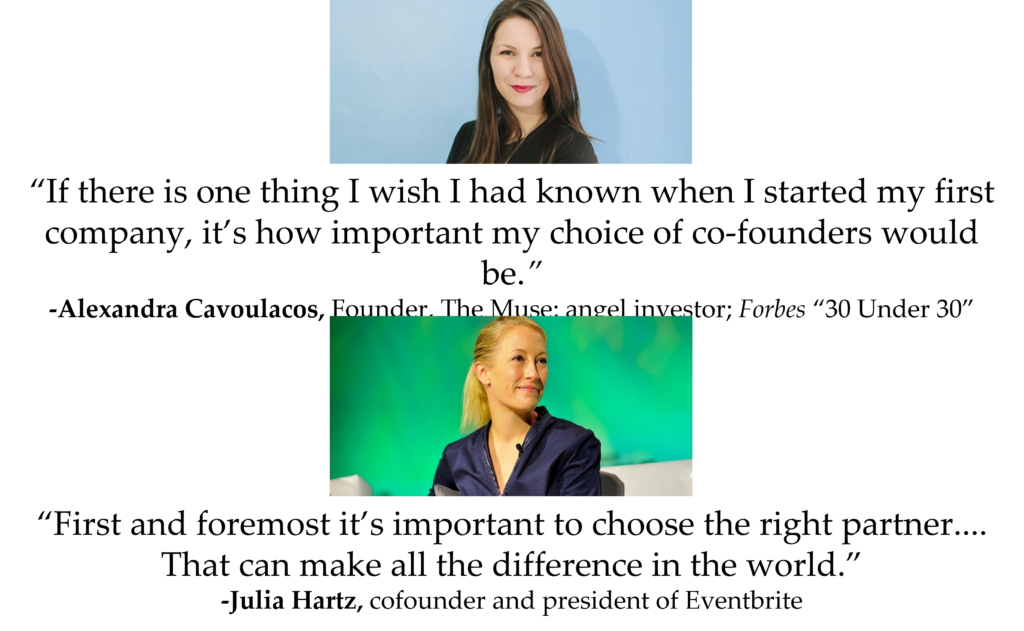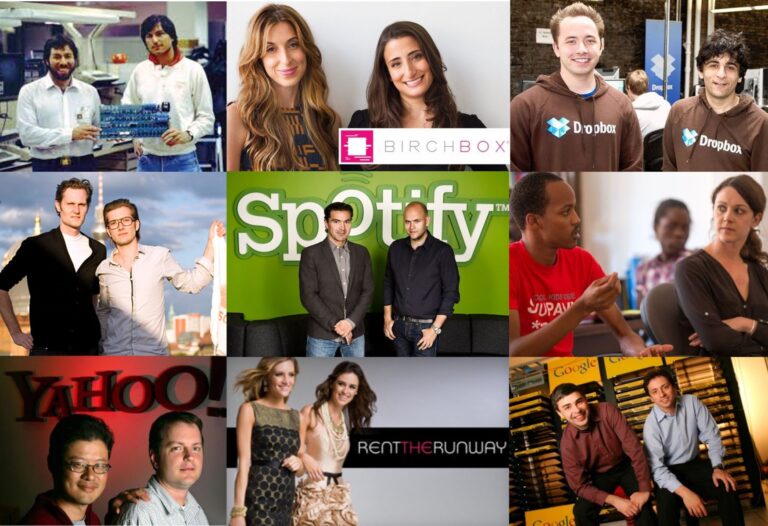When we think of entrepreneurship we tend to think of famous entrepreneurs.
Elon. Steve Jobs. Oprah. Mark Zuckerberg. Richard Branson. Jack Ma. Sara Blakely.
Can you think of any companies with co-founders?
It’s more than you might think.
Prominent Companies Started by Co-Founders
|
|
|
The Myth of the Solo Entrepreneur
We’re enamored with the myth of the solo entrepreneur, but in reality entrepreneurship is a team sport.
Entrepreneurship is a team sport.


It’s hard to know exactly what percentage of companies are started by solo entrepreneurs versus co-founders. Researcher Dr. Lerong He, writing in the Journal of Business Venturing, estimates that 50-70 percent of new firms are started by partners (more than one founder). Of the top 20 Y Combinator startups (in terms of valuation) recently, all of them have at least two founders.
When I taught entrepreneurship at the Stockholm School of Entrepreneurship, I used to enjoy asking my students if they knew what the following startups had in common: Birchbox, Bright Horizons, Dropbox, Google, HP, Rent the Runway, SoundCloud, and Yahoo? Any guesses?
Their co-founders were all classmates. If you’re in school, part of your job is to study and learn and pass your exams. Another part of your job is to meet interesting people that may become great friends or, who knows, partners.
The Critical Co-Founder Decision
Choosing your co-founder(s) is clearly one of the most important decisions you’ll make. Yet many people overlook it. And then it comes back to bite them.
Many have likened the co-founder relationship to a marriage, with all the time spent together, the pressures, the importance, and more. Too often, it devolves into blaming and mistrust. And sometimes into a painful divorce (and one that can destroy the venture).

“The moment of truth is when you ask, ‘Are these the people I want to be in trouble with for the next five, ten, fifteen years of my life?’ Because as you build a new business, one thing’s for sure: You’ll get into trouble.”
-John Doerr, Kleiner Perkins


How to Pick Co-Founders
In his article, “How to Pick a Co-founder,” entrepreneur Michael Fertik outlines ten helpful criteria for choosing a co-founder:
- Complementary temperament
- Different operational skills
- Similar work habits
- Self-sufficiency
- History of working together
- Emotional buoyancy
- Total honesty
- Comfort in own skin
- A personality you like
- The same overall vision
That’s a great list, and I’d underline a few—history of working together, emotional buoyancy, total honesty, and comfort in own skin—as being especially important.
What to Probe For
I’d also add eight things to probe for when considering someone as a potential co-founder:
1. Integrity. Fertik mentions total honesty, but integrity goes beyond that. It includes a strong moral compass, a commitment to ethical decisions and actions (”doing the right thing, even when it’s costly or hard,” as we defined it in Triple Crown Leadership: Building Excellent, Ethical, and Enduring Organizations), and the sense of wholeness that comes from knowing who you are, embracing that, and not living a divided life.
2. Affinity. Do you like her? Are you energized by her, or drained? Do you resonate with her?
3. Admiration. Is this a person you look up to, at least in some ways? Someone who can bring out the best in you and help make you better?
4. Culture. Do you agree on the type of organizational culture you’d like to build? Have you talked about it, and are you in sync about this critical piece (one that many startups overlook, at their peril)?
5. Commitment. Given the level of risk you’ll be taking on together with a new venture in brutal conditions of time pressure, resource constraints, uncertainty, and chaos, are you certain that this person is fully committed to this venture? And do you have evidence of this in their actions and investments, not just their words?
6. Emotional intelligence. Can he recognize and understand emotions in himself and others? And can he use that awareness effectively to manage his relationships and actions? Does he have emotional blind spots or triggers that get the best of him?
7. Different experience and outlook. You don’t need a clone. You need someone who comes from a different vantage point, with a different background, and with a different viewpoint on things. This will cause some confusion and conflict, but if you can manage through it you’ll end up making much better decisions in the long run.
8. “Head and heart.” In Triple Crown Leadership we noted that most people tend to focus on “head” characteristics (like knowledge, skills, technical competence, and intelligence) when evaluating people, while ignoring “heart” characteristics (like courage, passion, resilience, and authenticity). The latter can be just as important, and sometimes even more so—especially when you’re under fire together.
“My biggest mistake is probably weighing too much on someone’s talent and not someone’s personality. I think it matters whether someone has a good heart…. Starting and growing a business is as much about the innovation, drive, and determination of the people behind it as the product they sell.”
-Elon Musk, entrepreneur
Helpful Assessments
It can be hard to know a lot about someone before working closely with them over time. Sometimes assessments can provide more information as you explore complementarity and fit. Some examples:
- DISC Assessment
- StrengthsFinder 2.0
- Sparketype
- Leadership Derailers Assessment
- Traps Test
- Personal Values Exercise
Of course, assessments have their limitations.
The best way to vet this is to work with someone intensively under challenging conditions. Then you can really get a sense of how well you work together, your trust levels, and how well you work through challenges and conflict.
Bottom line: Look before you leap, and choose wisely. You’ll be very glad you did.
Reflection Questions
- How much scrutiny do you use in assessing co-founders?
- What’s your process, and how might it be improved?
- What are you looking for?
Related Articles
- “The Essence of Entrepreneurship“
- “Founder-Venture Fit for Entrepreneurs“
- “How to Pick a Co-Founder”
- “Building a Business Partnership that Lasts”
- “Looking for Love in All the Wrong Places: How to Find a Co-Founder”
- “7 Traits to Look for in a Startup Cofounder”
- “34 Questions to Ask a Potential Co-Founder”
Videos on Co-Founders
- “Ben Horowitz on Selecting Co-Founders”
- “The Co-Founder Working Relationship” (with Kevin Systrom and Mike Krieger, co-founders, Instagram)
+++++++++++++++++
Gregg Vanourek is a writer, teacher, TEDx speaker, and coach on leadership and personal development. He is co-author of three books, including LIFE Entrepreneurs: Ordinary People Creating Extraordinary Lives (a manifesto for integrating our life and work with purpose, passion, and contribution) and Triple Crown Leadership: Building Excellent, Ethical, and Enduring Organizations (a winner of the International Book Awards). Check out his Best Articles or get his monthly newsletter. If you found value in this article, please forward it to a friend. Every little bit helps!

